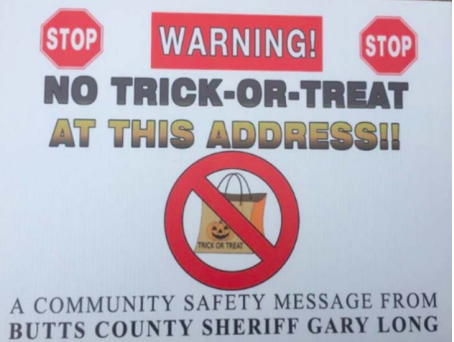Three people on the sex offense registry in Georgia sued the Butts County Sheriff’s Office for placing “NO TRICK-OR-TREAT AT THIS ADDRESS!!” signs on their lawns. This was not only trespassing, said the plaintiffs, the signs themselves amounted to compelled speech.
Yesterday, just in time for Halloween, federal Judge Marc T. Treadwell ruled in favor of the registrants. With good reason! As the complaint pointed out: These men did not constitute a danger to kids.
…[M]any years ago they committed offenses that fall within the State of Georgia’s definition of sex offenses. Since then, they have served their terms of imprisonment and have, as far as the law is concerned, paid their debts to society. But because they have been classified as sex offenders, they remain subject to Georgia’s lifelong requirement that they register with their local sheriff.
Lifelong! No chance for them to ever clear their names!
But by all accounts, they are rehabilitated. They live productive, lawabiding lives. Two of the named Plaintiffs live with their parents; one has a six-year-old daughter living with him. The State of Georgia, under its system for classifying sex offenders, has not determined that they pose an increased risk of again committing a sexual offense. Yet their Sheriff finds it necessary to post signs in front of their homes announcing to the public that their homes are dangerous for children. The Sheriff’s decision is not based on any determination that the Plaintiffs are dangerous.
As the men’s lawyer, Mark Yurachek, said in an interview, “The public image of who they are and what they do is wildly incorrect.”
Sheriff Long has stated that he will stop at nothing to ensure the safety of children in his town. Amen to keeping kids safe! But to do that, rather than placing signs on registrants’ lawns, the Sheriff should be placing police at the busiest intersections on Halloween. This would make real safety sense, because there is indeed an increase in kids getting hit by cars on Halloween. But there is zero increase in kids getting molested by registrants.
A study of 60,000 crime records from before and after localities started imposing Halloween sanctions on people who’d committed sexual offenses (like requiring them to turn off all their lights, or go to the local precinct during prime trick or treating hours) found no difference in the sex crime rate with or without the sanctions. That’s because it is a myth that registrants go wild on Halloween and molest trick or treaters. As Johns Hopkins’ Prof. Elizabeth Tourneau, Director of Moore Center for the Prevention of Child Sexual Abuse, explained:
Many states require convicted sex offenders to attend education programs the night of Halloween. They can also be prohibited from leaving their homes or opening their doors. They can be banned from costume parties and not allowed to decorate their houses. The belief is that these policies keep convicted sex offenders from making contact with children. It’s also believed that sex offenders could use costumes to hide their identifies. However, law enforcement officials note that Halloween policies weren’t developed because of a large or growing number of abuse cases…
The idea that sex offenders are more likely to harm children on Halloween is simply unfounded. The data don’t prove it. Child sexual abuse is no more likely to occur on Halloween than on any other night.
In fact, the National Association for Rational Sex Offense Laws (NARSOL), which initiated and financed the Butts County lawsuit, issues this challenge year after year: Find ONE instance of a trick or treater harmed by a registrant on Halloween. As NARSOL spokeswoman Sandy Rozek has written:
There are still, as far as exhaustive research can determine, zero cases of child molestation by someone on a sex offender registry in connection with trick-or-treat or Halloween, and that is both in the states that enforce restrictions and print warnings in every media source and those that do not.
And so the signs on the lawns — and the other restrictions visited on registrants on Halloween, as well as the media’s obsession with the idea of predators pouncing on trick or treaters — are just virtue-signaling on the part of Sheriff Long. Or maybe the term is vigilante-signaling: Stirring up hate and fear and calling it a public service.



